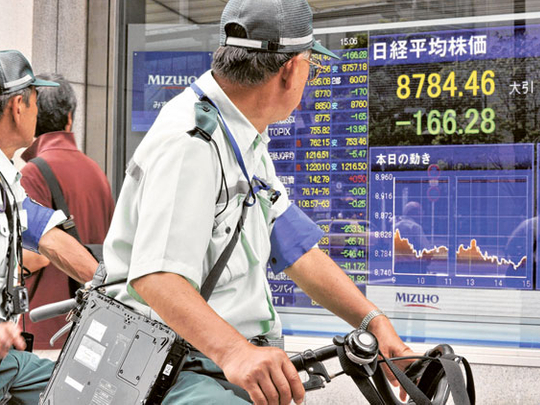
Tokyo: Japanese Finance Minister Jun Azumi said recent yen movements have been abrupt and have strayed from economic fundamentals, a sign he shares his predecessor's concern about a currency trading near a postwar high.
"There's no doubt that the recent strengthening of the yen has been abrupt and that Japan's economy is in a very severe situation," Azumi said in an interview with a group of reporters in Tokyo yesterday after being sworn in last week. "I will keep an eye on speculative movements with great interest."
Azumi is charged with ensuring the currency's climb against the dollar doesn't derail the nation's recovery from March's record earthquake. His predecessor Yoshihiko Noda, who is now premier, oversaw three rounds of yen sales to counter the currency's appreciation, intervention that failed to prevent the yen from reaching a record 75.95 per dollar last month.
Noda, who became Prime Minister last week, ordered ministers to compile measures to alleviate the impact of strong yen on companies and households. Azumi was asked to lead efforts to compile the third extra budget after the former premier Naoto Kan introduced two packages to endorse 6 trillion yen (Dh287 billion) spending for relief efforts and reconstruction.
Stronger yen
Azumi, the nation's eighth finance minister in three years, said companies are having trouble coping with the stronger yen. He also said he wants the Bank of Japan to take appropriate policies when necessary, adding that that they have been doing a "fine job" so far.
The yen traded at 76.82 per dollar in Tokyo. It has appreciated more than 4 per cent in the past three months. Azumi said that he wants to express concern about the yen hurting Japan's recovery from the quake when he meets his Group of Seven counterparts for the first time at a gathering this week in France. "I'd like to share the view that an excessively strong yen isn't good for the global economy," he said in today's interview. "It's common sense that currencies should move in line with the strength of the economy in the long term."
Debt woes
Apart from the already earmarked expenditure, the government estimated it will need to invest 13 trillion yen for reconstruction in five years. Additional spending may compound the nation's debt woes. Moody's Investors Service lowered the nation's sovereign-credit rating last month on concern that the government will fail to rein in its debt load, the largest in the industrialised world.
Exchange-rate appreciation threatens to hurt exporters' earnings, impairing a forecast rebound from three straight quarters of economic contraction. Recent reports showed that capital spending tumbled 7.8 percent in the second quarter and the unemployment rate unexpectedly rose to 4.7 per cent in July.












